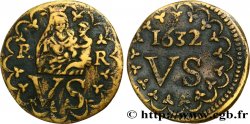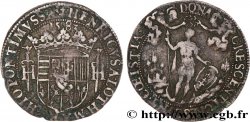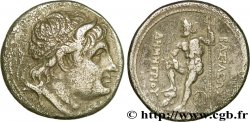E-auction 383-295950 - fwo_601160 - ALEMANIA - PRUSIA 1/3 de Thaler Frédéric II 1772 Berlin
Usted debe firmar y ser un comprador aprobado para pujar, Inicia sesión para pujar. Las cuentas están sujetas a la aprobación y el proceso de aprobación se alcanzan dentro de las 48 horas. No espere hasta el día en una venta se cierra el registro.Al hacer una oferta en este artículo usted está firmando un contrato jurídicamente vinculante para comprar este artículo y haga clic en «oferta» constituye una aceptación de los términos de uso de e-auctions de cgb.fr.
La subasta debe ser colocado en euros enteros cantidades venta only.The se cerrará en el momento en la descripción del artículo, no se ejecutarán las ofertas recibidas en el sitio después de la hora de cierre. Veces Transmition pueden variar y las ofertas pueden ser rechazadas si espera a los últimos segundos. Para más información envie el FAQ.
SIN GASTOS PARA LOS COMPRADORES.
SIN GASTOS PARA LOS COMPRADORES.
| Valoración : | 30 € |
| Precio : | 21 € |
| Oferta más alta : | 27 € |
| Fecha de fin de la venta : | 17 agosto 2020 17:16:30 |
| participantes : | 7 participantes |
Tipo : 1/3 de Thaler Frédéric II
Fecha: 1772
Nombre del taller / ciudad: Berlin
Metal: plata
Milésimas de pureza : 660 ‰
Diámetro: 30 mm
Eje de acuñación: 12 h.
Peso: 7,02 g.
Canto: décorée
N° en los catálogos de referencia :
Anverso
Titulatura del anverso: FRIDERICUS BORUSSORUM REX.
Descripción del anverso: Tête laurée à droite de Frédéric II.
Reverso
Titulatura del reverso: ✿ 3 ✿ / EINEN / REICHS / THALER / 1772 / A.
Descripción del reverso: Couronne de lauriers.
Comentario
Frédéric naquit à Berlin le 24 janvier 1712 et est le fils de Frédéric-Guillaume Ier. Il fut d'abord l'allié de la France dans la Guerre de Succession d'Autriche (1740-1748) puis il y eut retournement d'alliance lors de la Guerre de Sept Ans (1756-1763). Il fut l'un des grands vainqueurs du traité de Paris (1763) et participa au premier démembrement de la Pologne (1772). Frédéric II (1712-1786) fut le plus grand roi de Prusse. Ami de Voltaire, il écrivait en français et fut le modèle du despote éclairé de la seconde moitié du XVIIIe siècle. Il succéda à son père Frédéric-Guillaume, le Roi Sergent et fit de Berlin une véritable capitale et du Château de Sans Souci à Postdam un petit Versailles. Grâce à une politique belliqueuse, il fit de la Prusse l'état le plus puissant de l'Europe Orientale et contrebalança l'influence de l'Autriche et de la Russie. Il mourut au château de Sans-Souci (Potsdam), le 17 août 1786.
Frederic was born in Berlin on January 24, 1712 and is the son of Frederick William I. It was first France's ally in the War of the Austrian Succession (1740-1748) then there was a reversal of alliance during the Seven Years' War (1756-1763). He was one of the great winners of the Treaty of Paris (1763) and took part in the first dismemberment of Poland (1772). Frederick II (1712-1786) was the greatest king of Prussia. Friend of Voltaire, he wrote in French and was the model of the enlightened despot of the second half of the 18th century. He succeeded his father Frédéric-Guillaume, King Sergent and made Berlin a real capital and the Château de Sans Souci in Potsdam a little Versailles. Thanks to a warlike policy, he made Prussia the most powerful state in Eastern Europe and counterbalanced the influence of Austria and Russia. He died at the castle of Sans-Souci (Potsdam), August 17, 1786
Frederic was born in Berlin on January 24, 1712 and is the son of Frederick William I. It was first France's ally in the War of the Austrian Succession (1740-1748) then there was a reversal of alliance during the Seven Years' War (1756-1763). He was one of the great winners of the Treaty of Paris (1763) and took part in the first dismemberment of Poland (1772). Frederick II (1712-1786) was the greatest king of Prussia. Friend of Voltaire, he wrote in French and was the model of the enlightened despot of the second half of the 18th century. He succeeded his father Frédéric-Guillaume, King Sergent and made Berlin a real capital and the Château de Sans Souci in Potsdam a little Versailles. Thanks to a warlike policy, he made Prussia the most powerful state in Eastern Europe and counterbalanced the influence of Austria and Russia. He died at the castle of Sans-Souci (Potsdam), August 17, 1786








 Informar de un error
Informar de un error Imprimir la página
Imprimir la página Comparte mi selección
Comparte mi selección Haz una pregunta
Haz una pregunta Consignar / vender
Consignar / vender
 Descriptivo
Descriptivo















